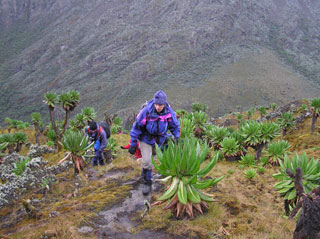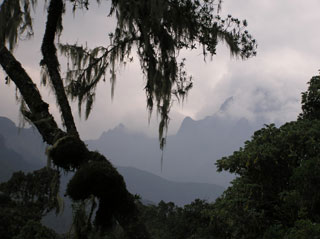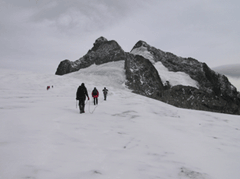|
Adventure
Sports - Trekking the Mountains of the
Moon
by Cam
McLeay
 I
pulled my sleeping bag over my head and
tightened the drawstring around my face. I
have been living in Uganda for over
3-years and couldn't remember the last
time I had actually climbed into my
sleeping bag, let alone pulled the hood
over my head - we live on the equator and
we are not used to feeling that
cold. I
pulled my sleeping bag over my head and
tightened the drawstring around my face. I
have been living in Uganda for over
3-years and couldn't remember the last
time I had actually climbed into my
sleeping bag, let alone pulled the hood
over my head - we live on the equator and
we are not used to feeling that
cold.
The next thing I knew
it was morning and light crept through the
window of the Guy Yeoman hut. I ventured
outside and mist swirled around in the
valley below. A brisk wind dispelled any
ideas I had of an early morning swim.
Smoke poured from beneath the roof of the
porters huts - a good sign that the fire
was warm and the day had begun. Putting on
the porridge seemed as good a start as any
but not before that first cup of tea. On
my way to the creek to fill the teapot a
mostly grey streaked between the giant
heather and I was able to make out clearly
at the end of the streak a Ruwenzori
Turaco. Even while half awake, I knew that
this would cause your most enthusiastic
twitcher to wet his pants with excitement.
I stood still to watch this remarkable
bird preen himself only meter's away and
reveled in the again in the magic of the
Rwenzori and mystery that still surrounds
the Mountains of the Moon.
I had climbed Mt.
Stantley 17-years earlier from the Congo
side but this was my first time to climb
the mountains from Uganda. The Mountains
of the Moon have lost none of their charm.
The mighty forest giants are as majestic
as when the first explorers ever saw them,
elephant trails still cross the foot
highways in the lower forests, chimpanzees
make their home near giant fig trees, one
is never far from the sound of running
water and the dramatic peaks are obscured
from view for most of the year.
 Our
team from Hima Cement had been in training
for months beforehand to get in shape for
what is probably the toughest climb on the
dark continent &endash; third highest
(Margherita 5189m) but physically the
greatest challenge. Charles had grown up
in the foothills of the Ruwenzoris but had
never ventured beyond the village trails,
Christian had flown in from La Farge -
Hima's parent company in France and Pal
had joined us from Bamburi Cement (another
La Farge company) in Kenya. The local team
had underestimated the importance of
footwear. Despite my detailed advice on
what kind of boots to search for in the
'Owino' of Kabale, they had turned up with
shoes more suited to a night on the dance
floor at Club Silk. What were they
thinking? They were making this too much
of a challenge for themselves. It was
challenge enough to wade through the Bigo
bog in gortex boots let along the 'silk
slippers'. But I had to remember they had
never seen snow before. Bosco could not
imagine beyond his wildest dreams how
difficult it is to balance on wet and
greasy logs knowing if you slipped you
would have to extract yourself from knee
deep mud renown for claiming the shoes of
intrepid hikers. Our
team from Hima Cement had been in training
for months beforehand to get in shape for
what is probably the toughest climb on the
dark continent &endash; third highest
(Margherita 5189m) but physically the
greatest challenge. Charles had grown up
in the foothills of the Ruwenzoris but had
never ventured beyond the village trails,
Christian had flown in from La Farge -
Hima's parent company in France and Pal
had joined us from Bamburi Cement (another
La Farge company) in Kenya. The local team
had underestimated the importance of
footwear. Despite my detailed advice on
what kind of boots to search for in the
'Owino' of Kabale, they had turned up with
shoes more suited to a night on the dance
floor at Club Silk. What were they
thinking? They were making this too much
of a challenge for themselves. It was
challenge enough to wade through the Bigo
bog in gortex boots let along the 'silk
slippers'. But I had to remember they had
never seen snow before. Bosco could not
imagine beyond his wildest dreams how
difficult it is to balance on wet and
greasy logs knowing if you slipped you
would have to extract yourself from knee
deep mud renown for claiming the shoes of
intrepid hikers.
 We
had chosen to attempt the Ruwenzori in
August when the clouds should be near
their thinnest and the rain should be
somewhere down in Zambia. However, it
seemed like someone forgot to pass the
message on. Swirling clouds of mist
swallowed our views of the peaks for most
of our trek and the bogs of the Uganda
Rwenzori were overflowing with water. A
huge amount of work has been done on the
trails and without the thousands of logs
laid across the swamps, I shudder to think
of how much greater our challenge would
have been. This was a teambuilding
exercise and it certainly brought all of
us closer together. Each day, we dragged
tired limbs from our sleeping bags,
wrestled with wet boots and climbed at a
steady pace toward those elusive peaks
that we glimpsed occasionally in the
clouds. The trails were littered with
large rocks and we spent a great deal of
time clambering over these on all fours,
large sections of the trail were sodden
from heavy rains and the bogs ruled
supreme. My gortex boots and gaiters
feared well but those porters really put
on quite the show. We
had chosen to attempt the Ruwenzori in
August when the clouds should be near
their thinnest and the rain should be
somewhere down in Zambia. However, it
seemed like someone forgot to pass the
message on. Swirling clouds of mist
swallowed our views of the peaks for most
of our trek and the bogs of the Uganda
Rwenzori were overflowing with water. A
huge amount of work has been done on the
trails and without the thousands of logs
laid across the swamps, I shudder to think
of how much greater our challenge would
have been. This was a teambuilding
exercise and it certainly brought all of
us closer together. Each day, we dragged
tired limbs from our sleeping bags,
wrestled with wet boots and climbed at a
steady pace toward those elusive peaks
that we glimpsed occasionally in the
clouds. The trails were littered with
large rocks and we spent a great deal of
time clambering over these on all fours,
large sections of the trail were sodden
from heavy rains and the bogs ruled
supreme. My gortex boots and gaiters
feared well but those porters really put
on quite the show.
Carrying large loads,
they were a wonderful advertisement for
gum boots (Wellingtons) as they leapt
nimbly between rocks, hauled themselves
over tree trunks fallen on the trails or
skillfully balanced in the bogs. We had
about 30 porters to support our team and
they were enjoying the experience as much
as we were. Aside from the sound of
squelching boots, distinctive bird calls
and thundering waterfalls, one of my
endearing memories from the climb is the
constant banter of the porters. These
little men of the mountains seemed really
at home here dashing ahead of our team of
climbers each day, pausing occasionally to
suck on some battered cigarette or
huddling together around the fires in the
evening for warmth.
At Bujuku Hut, our
hopes of reaching the summit of Margherita
peak rose and fell with the brightness of
the stars. Each time I dashed outside, a
sky full of stars made me hopeful we could
summit in clear weather. The promise of
the summit had me excited for myself but
especially for my new Ugandan friends who
would see snow for the first time. We
departed for the summit of Mt. Stanley in
the dark and it wasn't long before our
feet were wet and our heads were pounding
from the altitude. The pace had slowed
considerably and there was plenty of time
to take in the magnificent views down the
mountainside to Lake Bujuku. A fresh
dusting of snow had settled into the wet
moss and ice cold streams trickled beneath
the giant groundsells. I had forgotten the
simple pleasure of filling my mouth with
fresh snow crystals and gazing down on the
clouds from above. One foot up, balance,
then place the next. My breathing was
becoming shorter and and my steps closer.
I always feel that a large part of the
magic of the mountains is that my mind
wanders, I wonder what lies behind that
large cloud or over the next ridge or
under the rock I just stepped on. The thin
mountain air might make for vivid dreams
and light sleep at night but day is also
full of visions of hope and
wonder.
Soon we have reached
the ice fields and I wander around the
party checking the fit of crampons. Each
time I bend down my head throbs and soon I
am delighted be swinging my ice axe into
the glacier. A prolonged coaching lesson
on the fixing of ice screws, some
instruction on how to use crampons and the
team is soon traversing the steep ice face
that looms above us. Water rushes rapidly
toward the Mediterranean from beneath our
feet, the sun burns a bright hole through
the cloud and our crampons bite into the
blue ice. It is hard to believe that the
retreating glaciers of the Mountains of
the Moon are headed all the way for
Alexandria via the Nile. Roped together
for danger of falling into a crevasse, we
walk slowly across the ice field to the
high point amidst the mighty peaks of Mt.
Stanley &endash; ironically named after
the man who initially dismissed that they
existed. I am able to take a few group
photographs before a chilly snow storm
drives us back down the
mountain.
We settle for less than
the summit but the Hima Cement team were
tough challengers. On summit day, we
stumble into camp well after dark but
justifiably pleased with ourselves then
revel in our next few days in the
mountains. No-one said it was going to be
easy but what a place to spend some time.
The Turacos call up the valleys of their
misty home, a lone chimpanzee races across
the rocks after a brief encounter with Joe
Hudson and our footprints have long since
been washed away by the heavy rain.
However, the Mountains of the Moon leave
another impression that will not waste
away quite so quickly. For thousands of
years, these mountains have made a lasting
impression on those that saw or visited
them and today little has changed in the
high valleys and mighty peaks.
Cam McLeay
Adrift Adventure
Co.
www.surfthesource.com\
Photos
courtesy of Adrift Adventure Co., Kampala,
Uganda
|

